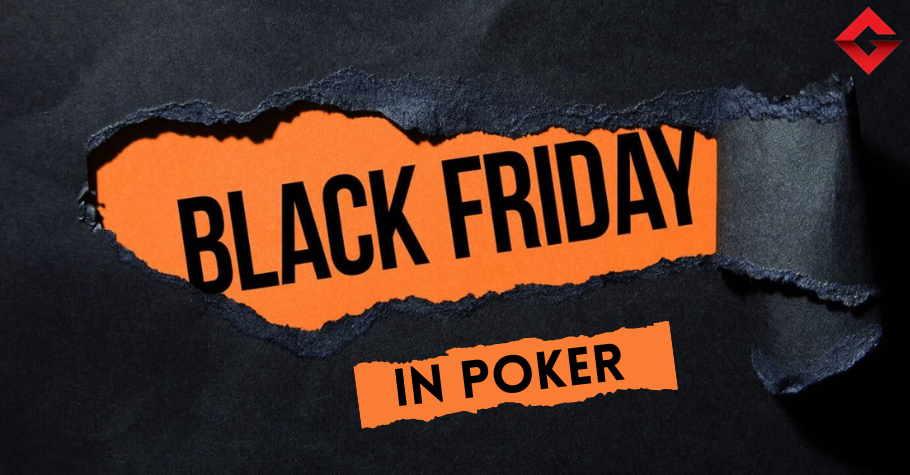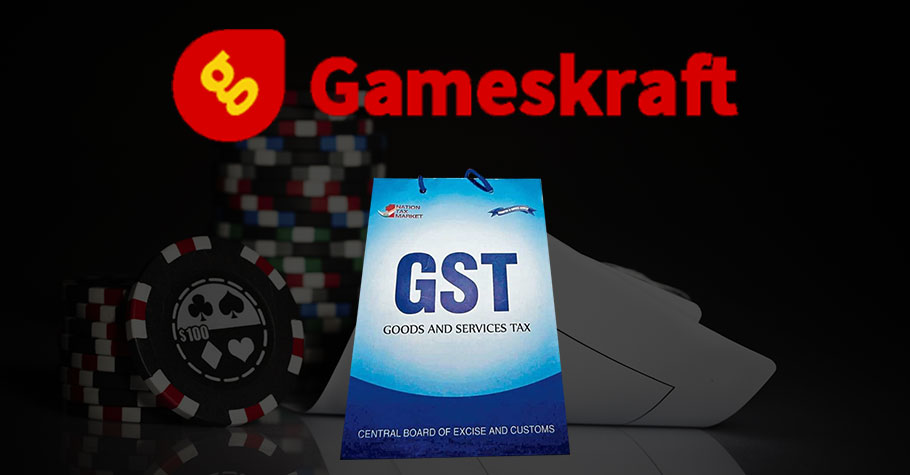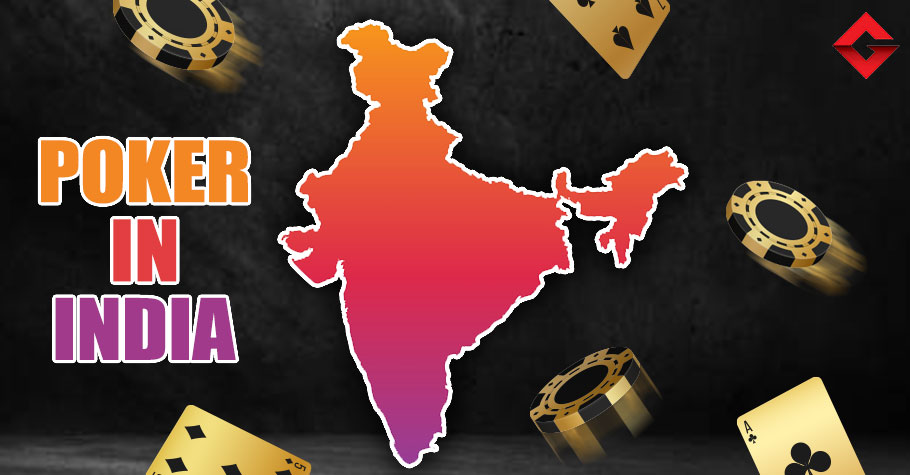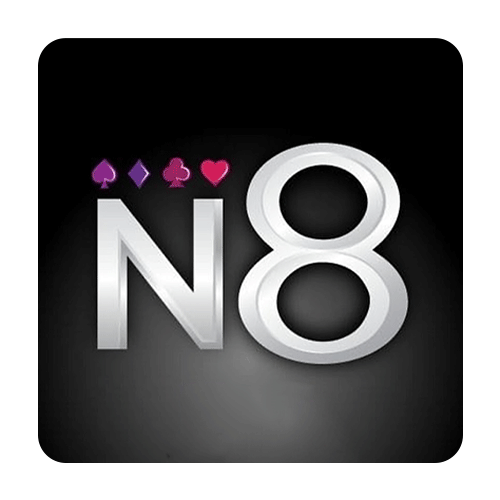 Poker
Poker
Online Gaming Looking At A Black Friday In India?
15th April 2011 is still a fresh memory for those who were a part of the global poker fraternity back in the day. And for those of us who were struck by the poker bug later, ‘Black Friday’ is something we have all heard of. A day that took the global poker community by a storm and how! While some regarded it as the end of the poker boom, others called it the beginning of a new era. Whatever it was, it left effects on the poker forever.
While Black Friday happened in the United States of America (USA), the impact was a big shocker for the poker community in the rest of the world. But what is Black Friday exactly? What happened that brought about so much change? Let’s first understand the entire Black Friday incident.
What is Black Friday in poker?
To begin with, when Chris Moneymaker won the World Series of Poker (WSOP) in 2003 after qualifying through an online qualifier, poker grew by leaps and bounds. The 2003 event, which was attended by 839 players, shot up and stood at 8,773 players by 2006, i.e., it grew over 10 times in just three years. Needless to say by then online poker had become a huge business. Amateur players who used to play poker just recreationally now started mastering their skills by playing countless games online. In fact, many of them even began to make a living by playing online games alone.
However, in 2006, the United States passed the Unlawful Internet Gambling Enforcement Act (UIGEA), which made most types of online gambling illegal. The act brought a full stop to the operations of the most profitable and popular online poker operators including PartyPoker. However, despite the law, Full Tilt Poker and PokerStars continued their operations monetising on the increasing popularity of the online game and thus went on to become the largest poker sites in America.
This continued for a good four-five years. In April 2010, the former head of Intabill, Daniel Tzvetkoff, was arrested by the Federal Bureau of Investigation (FBI). Intabill was a defunct Australian payment processor which was linked to PokerStars and Full Tilt Poker. Tzvetkoff was charged with accusations of money laundering, bank fraud, and wire fraud. Eventually, he became a government informant, and armed the then-US Attorney for the Southern District of New York, Preet Bharara with proof of how the gaming sites flouted UIGEA by the means of miscoding transactions through shell companies and also the SunFirst Bank located in Utah.
Finally, on 15th April 2011, the Black Friday descended and the Department of Justice issued their indictment. It implied that any profits received by Full Tilt Poker and PokerStars after the UIGEA was passed in 2006 would be considered as illegally gained since the act proclaimed online gambling as illegal in the US. The Department stated the offending sites managed to launder profits through small banks and payment processors, and claimed that the revenue from non-existent online merchants.
Naturally, Full Tilt Poker and PokerStars stopped offering the real money games. The FBI seized the domain names for both the sites, thus closing the doors, and leaving players without any access to the money deposited in their accounts. These deposits were estimated to be in millions of dollars. Later, the FBI agreed to allow the websites to reopen if the companies paid back the money in the players’ accounts. In July 2011, the sites were back in action however, now they offered games only for play money and not real money.
Meanwhile, among the bans and endless hearings, PokerStars founder Isai Scheinberg was also charged with five criminal charges related to PokerStars, including money laundering and bank fraud.
Well, the more we look at the Black Friday incident, the more our minds are inclined towards relating the series of incidents with those currently happening in India. It makes us wonder if we are heading towards witnessing India’s own Black Friday.
Poker Black Friday in India?
Predominantly, there are two things that make us foresee a Black Friday in the country. Take a look below.
Legality
Whether you are a real money gamer or in general an online gamer in India, you must be aware of the constant and unending back and forth happening regarding the legality of online games in the country. Whether poker is a game or skill or a game of chance, is a debate that has continued to keep the country divided over quite some years now.
One of the major reasons for this is the ambiguity regarding the game throughout the country. Currently, the state governments are free to decide the fate of online real money games in their respective states. This has led to many instances where the states have imposed bans on the operations of these games, and the petitions that followed in courts, either got quashed or upheld. The most recent headline-making states are Tamil Nadu, Karnataka and Meghalaya.
Around the same time last year, the Karnataka government implemented a ban on online gaming after making amendments to the Police Act of 1963. Upset by the ban, several online gaming sites pleaded to the Supreme Court to withdraw the ban. Four months later in February 2022, a Supreme Court bench struck down the ban. As per the bench, the ban was deemed as unconstitutional and far excessive.
On the other hand, in 2021, the Tamil Nadu state government had passed a law prohibiting all forms of online gaming, including the games of skill. Later the Tamil Nadu State High Court revoked the ban and ruled out the law to be ultra vires in its entirety. The court also observed that the Tamil Nadu state government could bring into force an ‘appropriate legislation’ to regulate online gaming. On 3rd October 2022, the Tamil Nadu state cabinet approved the Tamil Nadu Prohibition of Online Gambling and Regulation of Online Games Ordinance, 2022, following which on 7th October 2022, the TN State Governor gave his consent on the ordinance that banned online games in the state.
Earlier this year, the Meghalaya Regulation of Gaming Act, 2021, was passed which gave a green signal to establishments of casinos as well as online gaming in the northeastern state. However, that too was revoked earlier this month by the Minister of Taxation, James Sangma, following opposition from social groups including the church.
Tax Issues
Last month, the Goods and Service Tax (GST) department of India, issued an intimation notice dated 9th September 2022 to Bengaluru-based online gaming firm Gameskraft Technology Pvt Ltd. The notice claims the company has taxes worth ₹20,989 Crore due for the period between August 2017 to June 2022. The department stated that the business activities and offerings of Gameskraft involve betting and gambling in nature. According to the department, Rule 31A of the CGST Rules, 2017 specifies that 100% face value of the bet is subject to tax at the rate of 28%.
In disagreement to the notice, the online gaming brand turned to the Karnataka High Court and filed a writ petition against the notice issued to them. Gameskraft claims that it has already paid more than ₹1,500 Crore as GST to date. The company claimed that in India, casino operators have to compulsorily pay 28% GST on the entire bet amounts. As against this, the online skill games are taxed at 18% GST. Additionally, Gameskraft also said that as per existing laws, games of skill are expected to pay 18% GST, while games of chance are required to pay 28% tax. Accordingly, Gameskraft had paid 18% tax applicable to them since they were an online gaming business offering skill based games. The petition is pending with the court and the proceedings are said to take place in the coming days.
ALSO READ: Poker In India: Headway Or Headache Is Coming?
A few days after the GST department issued the notice to Gameskraft, Central Board of Direct Taxes Chief Nitin Gupta claimed that prize money worth over ₹58,000 Crore has been won through online games in the past three years. Considering the huge amounts, the income tax (IT) department had started issuing tax notices to players who in the three years have played and won real money prizes via online games.
Gupta had said that the notices were displayed on tax compliance portals, and the players were asked to look into the matter at the earliest. Additionally, the players were expected to pay the due taxes voluntarily. The IT department was undertaking enforcement actions wherever they found substantial evidence and only then notices were being issued to the players.
Taxes remain to be a big hurdle for the businesses operating online gaming as well as the players. Talking from the player perspective, say a pro, travels to Las Vegas to play the World Series of Poker (WSOP), or even an Asian country to play. The player wins a considerable amount by playing at the international series. The player will be taxed on his/her winning amount, however, the law does not take into consideration the cost incurred on travelling, accommodation and others while the player was in a foreign land.
Apart from this, there are several poker players who are migrating to other countries just to escape from the uncertain tax laws in India. Although it may not be spoken about more often, this is a widely followed practice in the country.
Whether or not a Black Friday is approaching in India, looks like the uncertainty regarding the game is here to stay for a while, before the county has concrete and uniform laws for online real money games. Many from the industry have urged the government for a central working body that would govern all of online gaming in the country, but so far no concrete move has been made by the government which offers relief to the operators.
For more news and updates, keep reading GutshotMagazine.com. Follow us on Facebook, Instagram, Twitter, and Telegram.

Amarylisa Gonsalves is a Content Writer at Gutshot Magazine. Advancing from a marketing background, she found her calling in writing. She takes delight in exploring genres and is a curious learner. Patient and ambivert, she believes in letting her work speak for itself. Apart from content writing, she finds solace in writing poetry by expressing herself through words. Additionally, she adores indulging in anything that satisfies her creative self, like drawing and DIY crafts.
More News
Top 15 Poker Rooms
-
WPT Global
Grab your welcome offer
Offer: 100% of your deposit back up to $3,000 Register -
PokerDangal
Sign up with code GUTSHOT1
Offer: Get 100% GST discount on deposits Register -
Natural8 India
Sign-up with Gutshot
Offer: Get extra 28% on all deposits Register -
Spartan Poker
Sign-up with referral code AFFGSMAG
Offer: FTD 50% Bonus Money up to ₹20K. Deposit code ‘ALLIN50’ Register -
Junglee Poker
Sign-up and get bonus
Offer: Up to ₹50,000* Register -
Calling Station
Sign-up with promo code 'AFFCSGUT'
Offer: 30% FTD bonus with code FTD30 Register -
WinZo Poker
Daily Winnings Up To ₹40 Crore!
Offer: Get ₹550 Joining Bonus For Free Register -
Stake Poker
Welcome bonus
Offer: 200% up to ₹120,000 Register
Newsletter
Thank you for subscribing to our newsletter.
This will close in 20 seconds

























